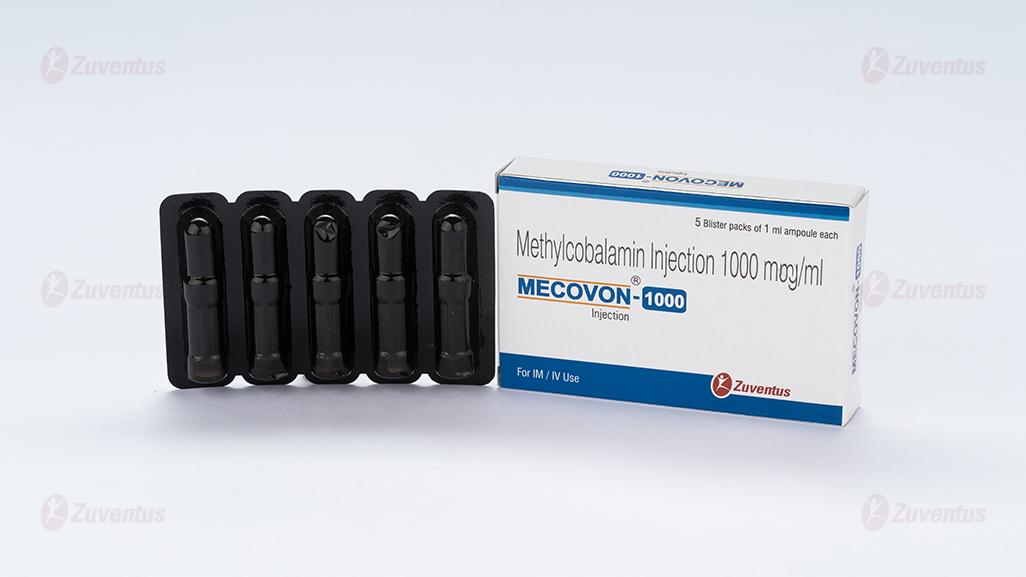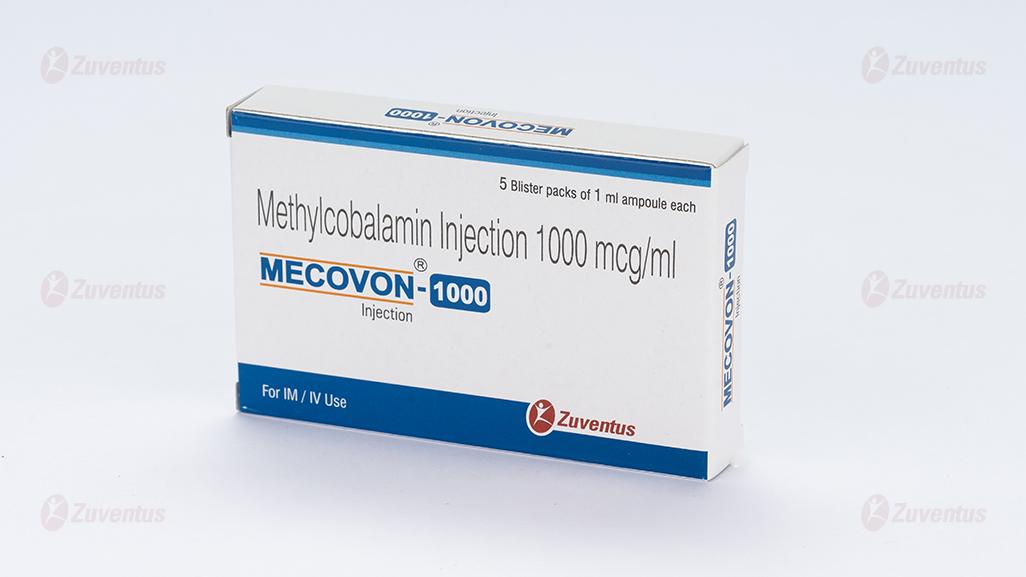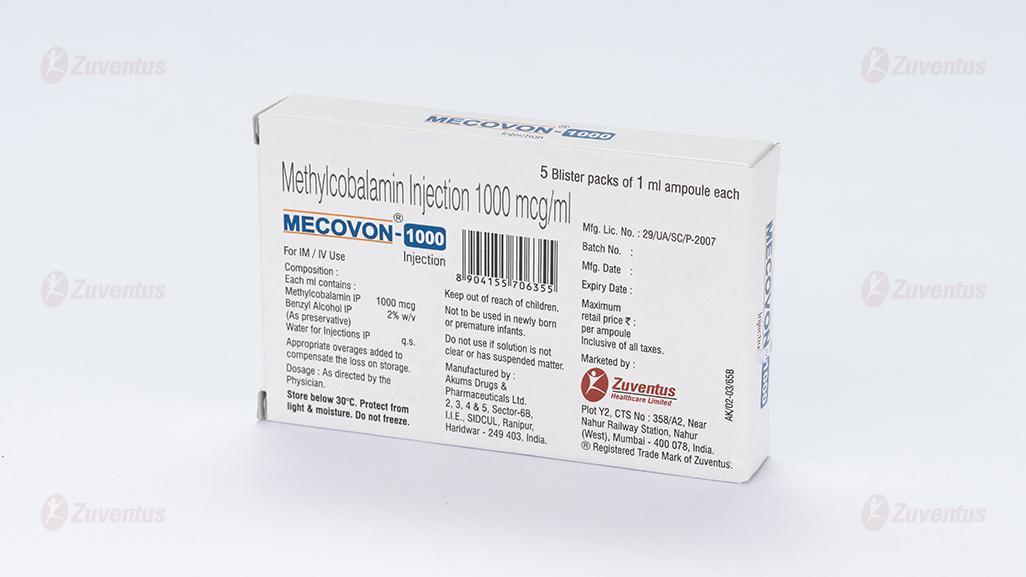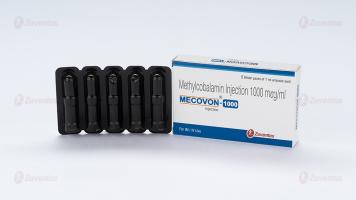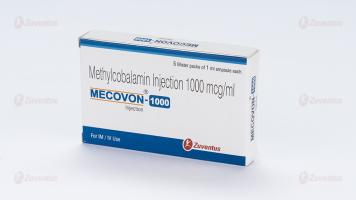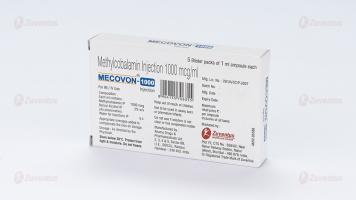Mecovon®-1000 Injection
1.0 Generic Name
Methylcobalamin Injection 1000 mcg/mL
2.0 Qualitative and quantitative composition
Each 1 ml contains:
Methylcobalamin IP 1000 micrograms
Benzyl Alcohol IP 2% w/v
(as preservative)
Water for injection IP q.s.
Appropriate overages added to compensate the loss on storage
3.0 Dosage form and strength
For IM/IV use
1000 mcg/ml
4.0 Clinical particulars
4.1 Therapeutic Indications
Prophylaxis and treatment of macrocytic (megaloblastic) anaemias associated with vitamin B12 deficiency.
Addisonian pernicious anaemia.
For peripheral neuropathies caused by vitamin B12 deficiency.
Schilling test.
4.2 Posology and method of administration
Route of administration: intramuscular/intravenous injection
Adults and Children
Addisonian pernicious anaemia and other macrocytic anaemias without neurological involvement:
Initially: 250 to 1000 mcg on alternate days for one to two weeks, then 250 mcg weekly until the blood count is normal.
Maintenance: 1000 mcg monthly.
Addisonian pernicious anaemia and other macrocytic anaemias with neurological complications:
Initially: 1000 mcg on alternate days as long as improvement is occurring.
Maintenance: 1000 mcg monthly.
Prophylaxis of macrocytic anaemia associated with vitamin B12 deficiency resulting from gastrectomy, some malabsorption syndromes and strict vegetarianism:
250mcg - 1000mcg monthly.
Schilling Test:
An intramuscular injection of 1000 mcg Methylcobalamin is an essential part of this test.
4.3 Contraindications
Hypersensitivity to Methylcobalamin or any other constituents MECOVON-1000 Injection should not be used for the treatment of megaloblastic anaemia of pregnancy unless vitamin B-12 deficiency has been demonstrated. Not to be used in newly born or premature infants.
4.4 Special warnings and precautions for use
Precautions:
The dosage schemes given above are usually satisfactory, but regular examination of the blood is advisable. If megaloblastic anaemia fails to respond to MECOVON-1000 Injection, folate metabolism should be investigated. Doses in excess of 10 mcg daily may produce an incomplete haematological response in patients with folate deficiency. Indiscriminate administration may mask the true diagnosis. The haematological and neurological state should be monitored regularly to ensure adequacy of therapy. Cardiac arrhythmias secondary to hypokalaemia during initial therapy have been reported. Plasma potassium should therefore be monitored during this period. Platelet count should be monitored during the first weeks of use in megaloblastic anaemia due to the possible occurrence of reactive thrombocytosis.
4.5 Interaction with other medicinal products and other forms of interaction
Chloramphenicol-treated patients may respond poorly to MECOVON-1000 Injection. Serum concentrations of Methylcobalamin may be lowered by oral contraceptives but this interaction is unlikely to have clinical significance.
Antimetabolites and most antibiotics invalidate vitamin B12 assays by microbiological techniques.
4.6 Pregnancy and lactation
MECOVON-1000 Injection should not be used for the treatment of megaloblastic anaemia of pregnancy unless vitamin B12 deficiency has been demonstrated. MECOVON-1000 Injection is secreted into breast milk but this is unlikely to harm the infant, and may be beneficial if the mother and infant are vitamin B12 deficient.
4.7 Effects on ability to drive and use machines
None.
4.8 Undesirable effects
Hypersensitivity reactions have been reported including skin reactions (e.g. rash, itching) and exceptionally anaphylaxis. Other symptoms reported include fever, chills, hot flushing, dizziness, malaise, nausea, acneiform and bullous eruptions, tremor and injection site reactions including injection site pain, injection site induration and injection site necrosis. Reactive thrombocytosis can occur during the first weeks of use in megaloblastic anaemia.
Reporting of suspected adverse reactions
- Reporting suspected adverse reactions after authorisation of the medicinal product is important. It allows continued monitoring of the benefit/risk balance of the medicinal product. Healthcare professionals are asked to report any suspected adverse reactions via email to: medico@zuventus.com
- Website: http://www.zuventus.co.in/safety.aspx
By reporting side effects, you can help provide more information on the safety of this medicine.
4.9 Overdose
No overdosage has been reported with this drug. Treatment is unlikely to be needed in cases of overdosage.
5.0 Pharmacological properties
5.1 Pharmacodynamic properties
Methylcobalamin is a form of vitamin B12.
Vitamin B12 is present in the body mainly as methylcobalamin and as adenosylcobalamin and hydroxocobalamin. These act as co-enzymes in the trans methylation of homocysteine to methionine; in the isomerisation of methylmalonyl co-enzyme to succinyl co-enzyme and with folate in several metabolic pathways respectively.
Vitamin B12 is essential to growth, cell reproduction, hematopoiesis, and nucleoprotein and myelin synthesis.
Deficiency of Vitamin B12 interferes with haemopoiesis and produces megaloblastic anaemia.
5.2 Pharmacokinetic properties
Cobalamins are absorbed from the gastro-intestinal tract, but may be irregularly absorbed when given in large therapeutic doses. Absorption is impaired in patients with an absence of intrinsic factor, with a malabsorption syndrome or with a disease or abnormality of the gut, or after gastrectomy.
After injection of Methylcobalamin a large proportion is excreted in the urine within 24 hours; the body retains only 55% of a100-microgram dose and 15% of a 1000-microgram dose. Vitamin B12 is extensively bound to specific plasma proteins called transcobalamins; transcobalamin II appears to be involved in the rapid transport of the cobalamins to tissues. Vitamin B12 is stored in the liver, excreted in the bile, and undergoes extensive enterohepatic recycling; part of an administered dose is excreted in the urine, most of it in the first 8 hours; urinary excretion, however, accounts for only a small fraction in the reduction of total body stores acquired by dietary means. Vitamin B12 diffuses across the placenta and also appears in breast milk.
6.0 Nonclinical properties
None stated.
7.0 Description
Mecobalamin is a synthetic and active form of vitamin B12 that can cross the blood brain barrier without biotransformation, that may be used to treat or prevent vitamin B12 deficiency and its complications. Upon administration, mecobalamin is able to replace endogenous vitamin B12, increase vitamin B12 levels and improve vitamin B12 deficiency. Vitamin B12 is necessary for hematopoiesis, neural metabolism, DNA and RNA production, and carbohydrate, fat, and protein metabolism. It improves iron functions in the metabolic cycle and assists folic acid in choline synthesis. Its metabolism is interconnected with that of folic acid.
Molecular Formula: C63H91CoN13O14P
Chemical Structure:

8.0 Pharmaceutical particulars
8.1 List of excipients
Benzyl alcohol IP (2% w/v) Water for injections IP
8.2 Incompatibilities
None.
8.3 Shelf life
Refer on pack.
8.4 Special precautions for storage
Protect from light and moisture. Do not store above 30°C. Do not freeze. Keep out of the reach of children. Do not use if solution is not clear or has suspended matter.
8.5 Packaging information
5 blister packs of 1 ampule each.
9.0 Patient Counselling Information
Patients with pernicious anemia should be informed that they will require monthly injections of vitamin B12 for the remainder of their lives. Failure to do so will result in return of the anemia and in development of incapacitating and irreversible damage to the nerves of the spinal cord. Also, patients should be warned about the danger of taking folic acid in place of vitamin B12, because the former may prevent anemia but allow progression of subacute combined degeneration. A vegetarian diet which contains no animal products (including milk products or eggs) does not supply any vitamin B12. Patients following such a diet, should be advised to take oral vitamin B12 regularly. The need for vitamin B12 is increased by pregnancy and lactation. Deficiency has been recognized in infants of vegetarian mothers who were breast fed, even though the mothers had no symptoms of deficiency at the time.
Read all of this leaflet carefully before you are given this medicine.
- Keep this leaflet. You may need to read it again.
- If you have any further questions, ask your doctor or nurse.
- If you get any side effects, talk to your doctor or nurse. This includes any possible side effects not listed in this leaflet. See section 4
In this leaflet:
1.What MECOVON®-1000 Injection is and what it is used for
2.What you need to know before you are given MECOVON®-1000 Injection
3.How you will be given MECOVON®-1000 Injection
4.Possible side effects
5.How to store MECOVON®-1000 Injection
6.Contents of the pack and other information.
1. What MECOVON®-1000 Injection is and what it is used for
MECOVON®-1000 Injection is a form of Vitamin B12, an essential vitamin which is needed for the production of red blood cells.
MECOVON®-1000 Injection is used to prevent and treat certain types of anaemia, including Addisonian pernicious anaemia, and other kinds of anaemia which result from a deficiency of Vitamin B12.
MECOVON®-1000 Injection used to treat neuropathies due to deficiency of Vitamin B12.
It is also used for a test called the Schilling Test, which measures your ability to absorb Vitamin B12 from the bowel.
2. What you need to know before you are given MECOVON®-1000 Injection
You should not be given MECOVON®-1000 Injection if:
- You are allergic to the active ingredient, Methylcobalamin
- You are allergic to any of the other ingredients of MECOVON®-1000 Injection
- New-born or premature infants
If any of the above applies to you talk to your doctor.
Check with your doctor before being given MECOVON®-1000 Injection if:
- You are pregnant, planning to become pregnant or breast-feeding
- You have megaloblastic anaemia. This is a blood disorder where you have larger than normal blood cells
Tell your doctor if you are taking any of the following medicines:
Antibiotics (for treating infections) or antimetabolites (medicines which stop cells dividing, such as mercaptopurine for leukaemia), as these treatments may interfere with tests to measure the levels of Vitamin B12 in your blood or urine
- An antibiotic called chloramphenicol, as you may not respond well to MECOVON®-1000 Injection
- Oral contraceptives 'The Pill'
- Any other medicine, including medicines obtained without a prescription.
If any of the above applies to you talk to your doctor.
Pregnancy and breast-feeding
MECOVON®-1000 Injection should not be used in pregnancy for treating a kind of anaemia called megaloblastic anaemia, unless you also have a Vitamin B-12 deficiency.
MECOVON®-1000 Injection is found in breast-milk but it is unlikely that it will harm your baby.
If you are pregnant, trying to become pregnant or are breast-feeding, ask your doctor or nurse for advice before being given MECOVON®-1000 Injection.
Driving and using machines
MECOVON®-1000 Injection may cause dizziness. If this happens to you, do not drive or use, machinery.
3. How you will be given MECOVON®-1000 Injection
MECOVON®-1000 Injection will be given to you by your doctor or nurse in muscles or in your veins.
Important:
Your doctor will choose the dose that is right for you.
You will be given MECOVON®-1000 Injection by your doctor or nurse as an injection into a muscle or vein. You may be given it just once or it may be repeated every other day, weekly or monthly, depending on how much your body needs.
Adults and Children
- Treatment of anaemia:
- Without neurological (nervous system) involvement: Initially 250 – 1000 micrograms, every other day for 1 to 2 weeks, then 250 micrograms weekly until the blood tests are normal.
- Maintenance dose: 1000 micrograms every month.
- With neurological involvement: 1000 micrograms every other day for as long as improvement is noticed.
- Maintenance dose: 1000 micrograms every month.
- Prevention of anaemia:
- 250 -1000 micrograms every month.
- Schilling Test:
- 1000 micrograms.
Medical check-ups
While you are receiving this medicine, your doctor will want you to have regular blood tests to check your condition. This is to make sure that your medicine is working properly and that the dose you are receiving is right for you.
If you are given more MECOVON®-1000 Injection than you should
If you think you have been given too much MECOVON®-1000 Injection, you are unlikely to need any special treatment. However, if you suffer any discomfort or side-effects you should tell your doctor.
If you have any further questions about the use of this medicine, ask your doctor or nurse.
4. Possible side effects
Like all medicines MECOVON®-1000 Injection can cause side effects, although not everybody gets them.
Stop using MECOVON®-1000 Injection and seek immediate medical help if you have an allergic reaction.
This includes any of the following symptoms:
- Difficulties in breathing
- Swelling of your eyelids, face or lips
- Rash or itching especially those covering your whole body
- Collapse.
Effects on the heart and blood
- Low blood potassium levels and irregular heart beat during the early stages of treatment
- Thrombocytosis (where you have a high number of platelets in your blood)
Effects on the eyes and skin
- Acne-like rash
- Blisters
- Pain at the site of injection
- The skin may become hard at the site of injection
- The skin around the injection site may die.
Effects on the stomach and bowel
- Feeling unwell or sick
Effects on the nervous system
- Dizziness
- Tremor
Other effects
- Fever
- Chills
- Hot flushes
- Pain.
Reporting of side effects
If you get any side effects, talk to your doctor. This includes any possible side effects not listed in this leaflet. You can also report side effects directly: Website: www.zuventus.com and click the tab “Safety Reporting” located on the top of the home page. By reporting side effects, you can help provide more information on the safety of this medicine.
5. How to store MECOVON®-1000 Injectio
Keep this medicine out of the sight and reach of children. Do not use MECOVON®-1000 Injection after the expiry date on the label. The expiry date refers to the last day of that month. Store below 30°C. Keep MECOVON®-1000 Injection in the original packaging in order to protect it from light. Do not freeze. Your doctor or nurse will make sure your medicine is correctly stored and disposed of.
6. How to store MECOVON®-1000 Injection
Keep this medicine out of the sight and reach of children.
Do not use MECOVON®-1000 Injection after the expiry date on the label. The expiry date refers to the last day of that month.
Store below 25ºC. Keep MECOVON®-1000 Injection in the original packaging in order to protect it from light.
Your doctor or nurse will make sure your medicine is correctly stored and disposed of.
7. Contents of the pack and other information What MECOVON®-1000 Injection contains
Each 1ml ampoule of MECOVON®-1000 Injection contains 1000 micrograms of the active ingredient Methylcobalamin. Benzyl Alcohol IP 2% w/v (as preservative) Water for injection IP Appropriate overages added to compensate the loss on storage
What MECOVON®-1000 Injection looks like
5 blister packs of 1 ampule each.

